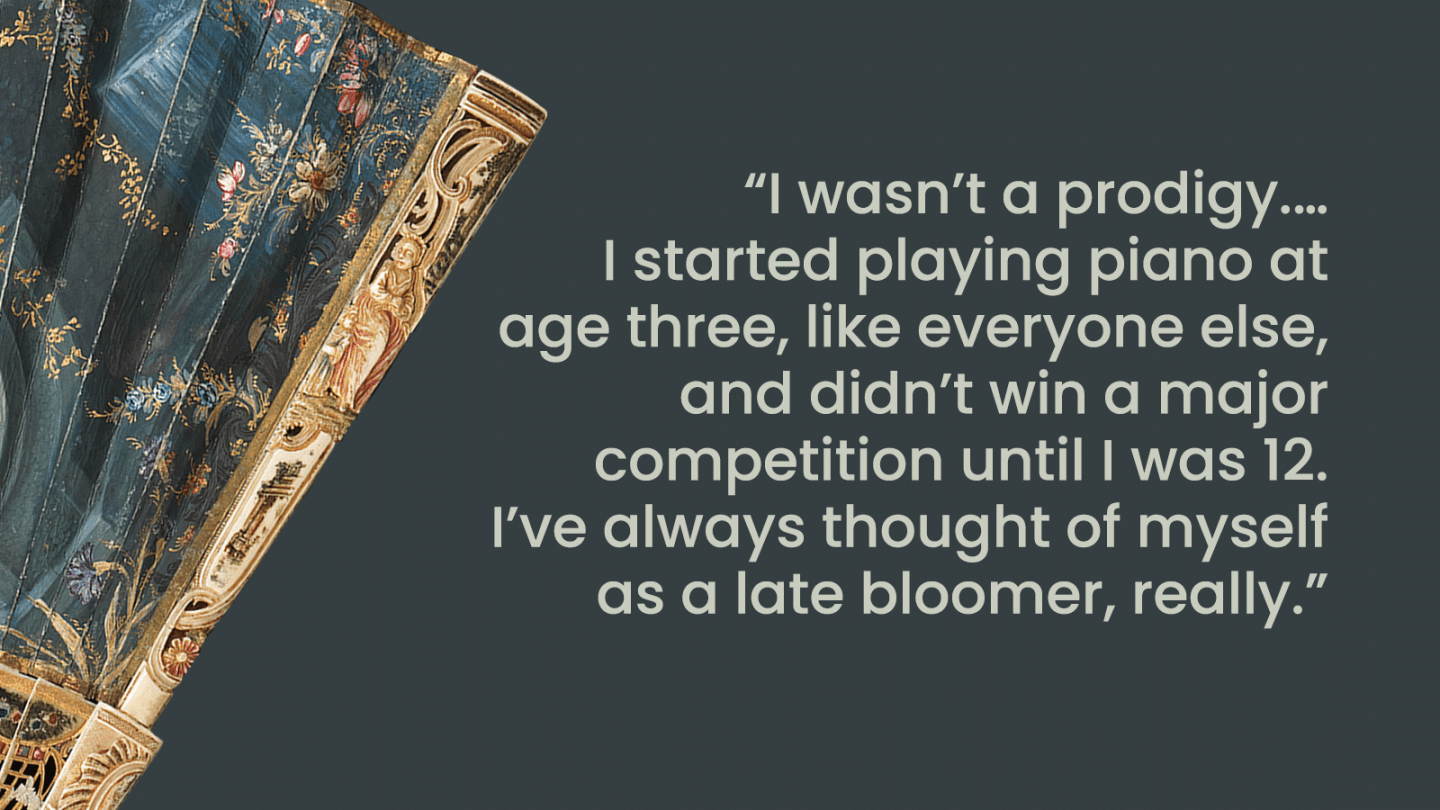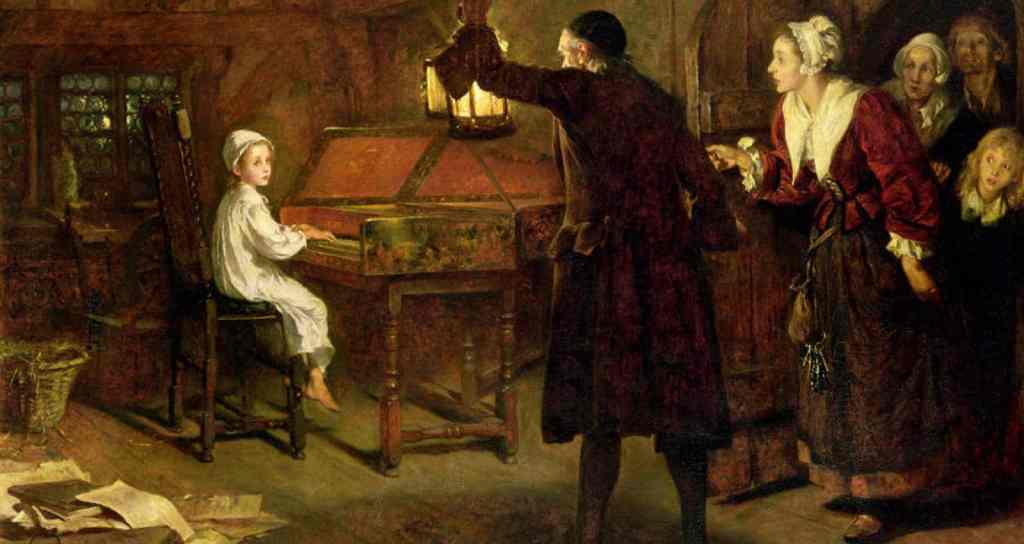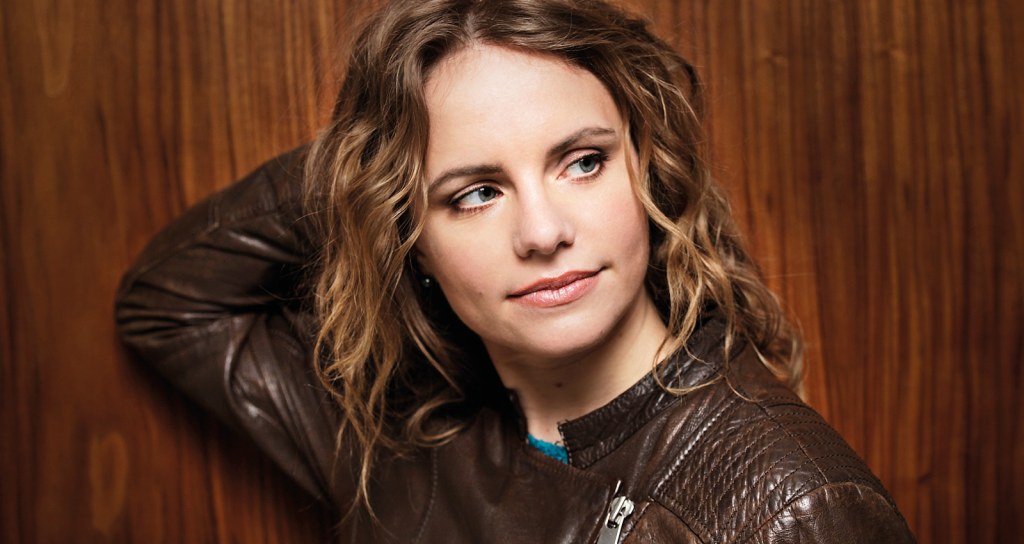The confused responses were rolling in. It was later in the morning than I’d like to admit when I woke up and pawed my phone off my nightstand, and it took a few minutes of baffled blinking at my notifications before I realized that my satirical riff on every classical music profile, “Meet the Pianist Revolutionizing Classical Music,” had gone live. And people were perplexed.
I’d figured the audience for the piece, and the increasingly niche jokes I sprinkled throughout, mostly for my own private amusement, was tiny. Despite a heavy hand in the opening—the Queen Elsa Competition! Judges revoking the medals of every previous champion! The name Key Playerson!—enough people read this piece as a serious profile of a real musician. His lack of a Spotify presence was questioned. Playerson’s comment that “No one who’s studied or appreciated classical music has ever gone on to oppress or hurt other people” was challenged with seemingly full sincerity. One reader wrote VAN concerned that I’d nefariously snuck a fake profile past the bamboozled editors. “If you’re surprised that people thought this was real and got upset, you’ve never met classical music fandom,” tweeted Boston Globe music reporter A. Z. Madonna.
When these people realized that my article was satire, the overwhelming response was that its components were simply too realistic to set off the “this is fake” alarm bells. Given that almost every single line was inspired by a real profile or memoir I’d read, I realized they had a point.

Read enough interviews with classical music’s hottest young virtuosos, and a paradox emerges: These are some of the most talented and unusual people in the world, living lives completely divorced from any general concept of normalcy, more akin to Olympic athletes than to your after-school soccer club. They should be incredibly interesting. And yet, once you step back, there’s a curious, flattened sameness to their stories.
Every profile seems just aware enough of this sameness that attempts are made to hastily explain that no, this artist is different. They’re relatable. They’re down to earth. They’re doing something outside the box with their gifts. Sure, succeeding within the classical world’s impossibly rigid standards means following the same playbook; but this artist has risen above it all to change the game.
The attempts to humanize these artists—while still elevating their godlike abilities—often minimize the very things that made their careers. There’s a collective downplaying of the work it takes to get to that level of ability and the connections required, hence the focus on raw talent. So many ridiculously accomplished young artists insist that they’re not “real” child prodigies that I’m starting to wonder what a “real” child prodigy is. (Is there some ur-prodigy out there, a virtuosic-yet-heartless infant, that everyone is comparing themselves to?)
The Prodigy Industrial Complex: A VAN Reader
What’s especially funny is that this isn’t a modern phenomenon. Breathless accounts of a young Clara Wieck Schumann were quick to point out that she was not like other precocious youth. Louis Spohr wrote, “Her playing is further distinguished from that of the ordinary prodigy,” and the Duke of Weimar was quick to note that she stood apart from lesser wunderkinder. Ignaz Moscheles, in writing about Fanny and Felix Mendelssohn, dryly noted that their parents “are not specimens of the genus Wunderkind-Eltern [“prodigy parents”], such as I must frequently endure.”
Even before social media algorithms started shaping narratives, musicians still performing today had to contend with the perils of being labeled a wunderkind. “I found it hurtful, because at the end of the day it meant that I had been given something ‘from God,’ and that was why I played how I played,” violinist Julia Fischer told VAN in December of 2020. “It annihilated the work I put in. For me personally, it wasn’t a wunder that I could play the Beethoven Concerto when I was 12. I could play it because I worked hard and practiced a lot.”

As Fischer suggests, there’s no getting around the fact that to be even remotely accomplished in classical music requires committing to a lived experience that simply cannot be sold as normal or relatable. Starting young is a requirement; while non-musicians are routinely astounded that I started piano at the age of 5 (often with the comment “Oh no wonder you’re so good,” as if the two-plus decades of work that followed are just incidental), that makes me aggressively average in the world of classical pianists. Many of my peers began formal training at 3. People who came to music “late” as teenagers or even twenty-somethings and go on to conservatory training are the exception, not the rule.
There are, of course, enormous classist implications here. As Jeffrey Arlo Brown puts it:
Classical music fetishizes the idea of “natural” musicality, but no child is born knowing that it sounds good, say, to emphasize an appoggiatura and then diminuendo into the resolution. The specific knowledge that falls under the umbrella term “musicianship” must be learned. The children of musical parents master these skills early on at home. First-generation musicians, in contrast, must be told by someone about the elements of classical style. That might not happen until their teenage years; their first attempts at music-making are often flawed. But when we mistake a musician learning something very early for them never having needed to learn it at all, we fold socioeconomic and early-childhood advantages into talent, a concept so biased and nebulous as to be nearly devoid of meaning.
On a very basic level, there is always something awe-inspiring about youthful accomplishment—the earlier it happens, the more impressive it is. I’m not so jaded as to be unimpressed when I see fourteen-year-old Scripps National Spelling Bee Champion Zaila Avant-garde do incredible things with a basketball. But classical music takes this fetishization of youth to dizzying levels. Growing up, I was keenly aware that there was no shortage of pianists younger and better than me: “Oh, you’re a 17-year-old who’s mastered ‘La Campanella’? Here, watch this video of an eight-year-old playing it faster and more cleanly than you.” As a fresh-faced conservatory graduate, I felt especially panicky when I read William Kapell’s ominous pronouncement, “By the age of twenty-five, a first-class artist is already first-class, or he will never be.” This was recorded in Gary Graffman’s memoir I Really Should Be Practicing, and came after Kapell told a 22-year-old Graffman that he was “not getting any younger.”
The latest from VAN, delivered straight to your inbox
When we talk to classical musicians right at the point where their impressive young age makes their astonishing abilities that much more startling, they—like most people their age—simply don’t have much unique life experience to share. Even if they are interesting, their repertoire isn’t allowed to be, adding an extra layer of casing to this sausage factory mentality. To be classically trained is to adhere to stringent program requirements. Top level conservatory programs and competitions require standardized repertoire, and any teacher worth their salt knows to stick to the rules. A pianist’s typical rep list might contain a Bach prelude and fugue, a Beethoven sonata, one of Chopin’s longer works, a Liszt etude, and a “contemporary” work (a requirement generally satisfied by anything written after 1900, which often doesn’t get any weirder than Ligeti at his most vanilla). And if you’re on the orchestral soloist track, a concerto or two a year—preferably the big warhorses, whose thorny, finger-straining passages are best learned at the age when a pianist has plenty of flexibility and stamina and a statistically lower risk of injury.

There is logic to this efficient modular system; learning and refining music is already time- and labor-intensive (multiple teachers required me to practice five hours a day, minimum) and a student’s yearly repertoire is strategically crafted to qualify them for multiple auditions and competitions. The “you must be this accomplished to ride” mentality in classical music means that, instead of exploring an open-ended world of possible repertoire, students have to “prove” that they can play certain works. As a result, musicians are left providing increasingly neurotic justifications that the same slate of tried-and-true pieces are obscure or culturally relevant. When David Finckel was given a chance in 2021 to address the justified criticism that his concert programming didn’t reflect the reality of a diverse society, his actual response was that “there is more variety and diversity in a single string quartet of Haydn than you can find in about a hundred works of other composers.”
To be clear, we are all capable of containing multitudes and I highly recommend it. Are the existing canonic favorites so rich, so inventive, that you could spend your life plumbing their depths and never be done? Absolutely. Are there also countless other works, particularly by historically marginalized composers, that deserve to be played and heard more? Without a doubt. Two things can be true at once; this is what some people call “complexity.”
All of this coalesces into an eternal pantomime of absurdity where young artists, trained from childhood to follow templates and not take risks, are forced in interviews to wade boldly into the shallows of cliché. Their relatively anodyne statements about music’s universality seem blandly soothing in an era where social media amplifies increasingly unhinged political beliefs, bad actors churn out disinformation in service to growing their personal brand, and “fake news” is a convenient device used to resolve cognitive dissonance. Asked for their takes on the social issue du jour, musicians often default to the “music is universal” line as a defense: our art stands above the filth of reality. As the late Linda Shaver-Gleason pointed out in 2018: “The erroneous belief that the equal tempered scale derives directly from the laws of physics can feed an unwarranted sense of cultural superiority, which can have very nasty implications, as we see all around us today.”

I don’t blame young artists for refusing to play in the muck (personally speaking, “cancel culture” discourse makes me want to walk into the sea). But it’s also frustrating that mild political views are touted as quirky hallmarks of well-roundedness, or a radical break from tradition when music is supposed to represent our full humanity and challenge our most tired, unexamined notions. I am not advocating that classical musicians start participating in the outrage mill or issue provocative statements on every hot-button topic, but it’s worth asking who this silence serves. It’s certainly not the musicians themselves, whose choices of concert wear, eyewear, and footwear (or lack thereof) become the subjects of 950-word op-eds and endless debate that overshadows their artistry. I bristle at the stereotype that classical music is a dull cadre of easily spooked, fusty old men, but the genre’s own acolytes aren’t helping me out much here.
What’s more, I cannot fault the young performers at the center of these profiles for the structural issues in classical music. By the time they’re labeled “up and coming,” they’ve already been mentored and guided by star teachers, labels, managers, and publicists who know exactly how the game is played and have handed down hard-won wisdom. They’re shaping a young artist in the industry’s own image. In return, audiences collect their performances like Pokémon cards. For all their appeal and power, many of these virtuosos don’t have the freedom to take risks—at least not until they’re established, old and wizened in their thirties, at which point they’re contracted out years in advance with punishing schedules that don’t allow for slow exploration, of their music or of themselves.
The problem with classical artist profiles, then, is not the artists themselves; it’s the way we discuss and approach classical music in the first place. We want the purity of sameness in our young artists, we want our art to be surgically removed from the complex messiness of everything else in the world, and we want to be assured that everything new can still be discovered in works we already know. It’s worth asking what we lose when we are handed everything we want. ¶
Subscribers keep VAN running!
VAN is proud to be an independent classical music magazine thanks to our subscribers. For just over 10 cents a day, you can enjoy unlimited access to over 875 articles in our archives—and get new ones delivered straight to your inbox each week.
Not ready to commit to a full year?
You can test-drive VAN for one month for the price of a coffee.







